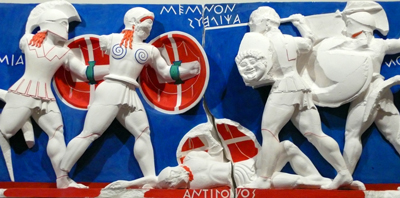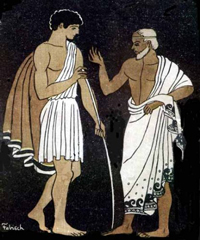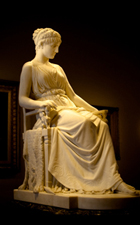
Source: Aquiles y Memnón, Ana Belen Cantero Paz, Wikimedia
The Odyssey, an epic poem, was passed down to the poet Homer through generations of ancient Greek storytellers and is actually the second part of The Illiad, a story about the Trojan War. A classic tale of endurance and courage, The Odyssey tells the story of King Odysseus who experiences incredible mishaps and great triumphs on his way home from the Trojan War.
In the story, Odysseus has been away for twenty years but is finally returning home. When he arrives home in Ithaca, the goddess Athena disguises him as a means to trick the men who have tried to usurp his throne and steal his queen in his absence. No one, including his family or servants, recognizes the long lost king. Dramatic irony occurs when Telemachus, Odysseus’ son, meets his father but believes him to be a beggar. Odysseus eventually reveals himself, but for a moment, we, the audience, know what Telemachus doesn’t. Greater tension is created in the scene because we are aware of Telemachus’ search for his father in the earlier parts of the story.

Source: Telemacheus and mentor, Wikimedia Commons
Odysseus learns from his son that the men who covet his throne and wife have camped out in his house. They assume that Odysseus is dead. The men are relentless in their pursuit of his wife, Penelope, and abuse her hospitality by eating, drinking, and mistreating the servants.
Telemachus and the disguised Odysseus return to the palace, and another moment of dramatic irony occurs. Odysseus sees Penelope for the first time in twenty years, but she doesn’t recognize him despite her longing to see him throughout the early part of the story. Again, the audience is aware that the beggar is Odysseus; we know what Penelope doesn’t. Read the following excerpt, part of Penelope’s speech, to see this dramatic convention in action.

Source: Penelope, nimishgogri, Flickr
“If only, my friend,” reserved Penelope exclaimed,
“everything you say would come to pass!
You’d soon know my affection, know my gifts.
Any man you meet would call you blest.
But my heart can sense the way it all will go.
Odysseus, I tell you, is never coming back,
nor will you ever gain your passage home,
for we have no masters in our house like him
at welcoming in or sending off an honored guest.”
 Using your notes, answer the questions below about dramatic irony in The Odyssey and Trifles. When you’re finished, check your understanding to see a possible response.
Using your notes, answer the questions below about dramatic irony in The Odyssey and Trifles. When you’re finished, check your understanding to see a possible response.- Why might Odysseus want to return disguised after so long an absence?
- How does dramatic irony make the scenes in The Odyssey and Trifles, the play you read about in the previous section, more interesting?
- Odysseus might want to see how things have changed in his absence, so he will know how to act.
- In Trifles, we wonder if the two women will actually hide the evidence since they are unsure about what to do. In The Odyssey, we wonder how the people around Odysseus will act when they don’t know his identity and what he will learn from their actions.